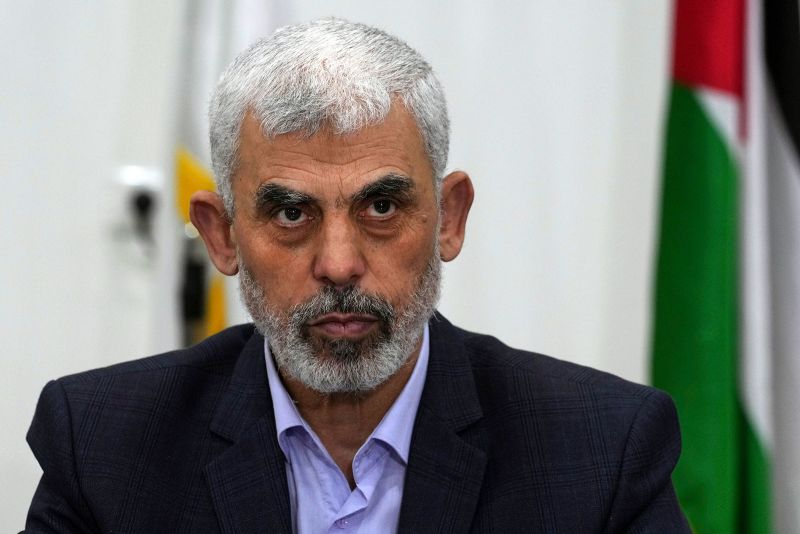Hamas leader Yahya Sinwar, believed to be one of the architects of the militant group’s October 7, 2023, terror attack and Israel’s most wanted man, was killed in Gaza on Wednesday, according to the Israeli military.
Sinwar was one of the key targets of Israel’s war against Hamas in Gaza, and Israeli officials branded him with many names, including the “face of evil” and “the butcher from Khan Younis.” Formerly a very public figure, Sinwar had not been seen since the October 2023 attacks, likely surviving the last year of Israel’s siege of Gaza by bunkering down in a vast network of underground tunnels.
In August, Sinwar became one of Hamas’ most senior leaders after his predecessor Ismail Haniyeh was assassinated in the Iranian capital Tehran.
But he had long been a key player in the militant group. Sinwar joined Hamas in the late 1980s, rising quickly through its ranks. He founded Hamas’ feared international intelligence security branch, the Majd, and was known for employing brutal violence against anyone suspected of collaborating with the Israelis. He was also viewed as a pragmatic political leader by some: In 2017, Hamas elected Sinwar as the political chief of its main decision-making body, the Politburo, in Gaza.
Sinwar was born in a refugee camp in 1962 in Khan Younis, southern Gaza. His family was displaced from the Palestinian village of Al-Majdal – now the Israeli city Ashkelon – during the Arab-Israeli war.
Sinwar enrolled in the Islamic University in Gaza in the early 1980s, where he studied Arabic, was involved in Palestinian nationalist student organizations and was detained for his participation in anti-occupation activism. In 1985, before Hamas was formed, he helped organize the Majd, a network of Islamist youths that exposed Palestinian informants working with Israel. Later, that group would be folded into Hamas’ security apparatus of the same name.
Sinwar was imprisoned in Israel on four life sentences in 1988, accused of orchestrating the murder of two Israeli soldiers and four Palestinians suspected of collaborating with Israel.
During his incarceration, Sinwar was said to have abused and manipulated fellow prisoners, punishing those thought to be informants and bullying others to undertake hunger strikes.
Sinwar said he spent his years in prison studying his enemy, including learning how to read and speak Hebrew through the Open University.
In 2011, he was released as part of a prisoner swap that saw more than 1,000 Palestinian prisoners exchanged for Gilad Shalit, an IDF soldier who had been held in Gaza for five years.
At that time, Sinwar called the exchange “one of the big strategic monuments in the history of our cause.” Sinwar’s release has been attributed to the fact that his brother was one of Shalit’s kidnappers, who insisted on Sinwar being included in the deal.
After being freed, he returned to Gaza where he began his rise in the militant organization, becoming notorious for the violent treatment he would dole out on suspected collaborators.
While some viewed Sinwar as a hardline militant, others saw him as a master strategist.
Fifteen years into his prison sentence, he used his Hebrew skills to urge the Israeli public to support a truce with Hamas in an interview with an Israeli broadcaster. “We will not recognize Israel, but we are ready to do a long-term truce with Israel that will bring calm and prosperity to the region,” he said.
And in a rare interview with an Italian journalist in 2018, Sinwar indicated that the group was willing to find a political solution, saying: “A new war is in no one’s interest.”
He also alluded to the reality he and others in Gaza were facing under Israel’s blockade, drawing from his own experience in Israeli jail. “I never came out – I have only changed prisons,” he said of life in Gaza.
In 2018, under Sinwar’s leadership, Hamas launched its “March of Return” campaign, which saw Gazans protest weekly near the Israeli border, calling for Israel to lift their blockade and to allow Palestinians the right to return to their ancestral villages and towns. The demonstrations drew international attention and support of human rights groups. At one of the protests, Sinwar applauded those facing “the enemy who besieges us.”
As the group’s political leader, Sinwar focused on the group’s foreign relationships, forging important ties with regional Arab powers.
He was responsible for restoring Hamas’ relationship with Egyptian leaders who were wary of the group’s support for political Islam, and for pulling in continued military funding from Iran, according to research by the European Council on Foreign Relations (ECFR).
Israel has publicly accused Sinwar of being the “mastermind” behind Hamas’ terror attack against Israel on October 7 – though experts say he is likely one of several – making him one of the key targets of its war in Gaza.
The attack was the deadliest assault in Israel’s history. Hamas and other Palestinian armed groups killed more than 1,200 people, mostly civilians, and also took some 250 people hostage into Gaza.
Sinwar was considered a vital decisionmaker and likely the main point of contact within Gaza during the intense negotiations over the return of the hostages taken into the enclave by Hamas in the October 7 attacks. The talks involved senior figures from Israel, Hamas, the United States, Qatar and Egypt.
Throughout the war, Sinwar consolidated the leadership of Hamas and became by far its most important figure. His influence grew even more following the killing of other senior Hamas officials, including Mohammed al-Masri, popularly known as Mohammed Deif, the commander of the Al-Qassam Brigades, the military arm of Hamas, and Deif’s deputy, Marwan Issa.
In 2015, Sinwar was designated a global terrorist by the US Department of State and the European Union. In recent years, he has been sanctioned by the United Kingdom and France.



























